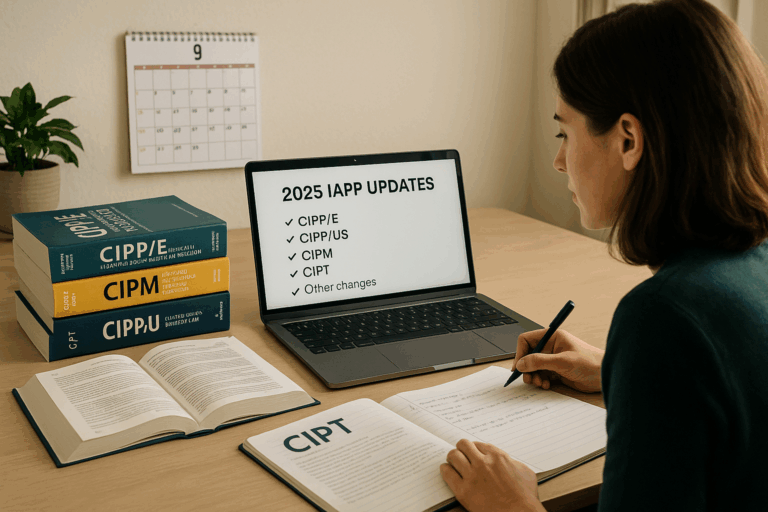Study Tip: Using Practice Exams for Certification Success
Earning a certification from the International Association of Privacy Professionals (IAPP)—whether it’s the CIPP/E, CIPM, AIGP, or other exams like the CIPP/US and CIPT—can be a career-defining achievement for privacy professionals. These certifications validate your knowledge of data protection laws, privacy principles, and practical applications, setting you apart in a rapidly evolving field. However, the path to success involves rigorous preparation, as each IAPP exam tests not only your theoretical knowledge but also your ability to apply concepts in real-world privacy scenarios.
To truly excel, utilizing sample questions and practice exams for certification success is essential. Simulating exam conditions allows you to become familiar with the question formats, manage your time effectively, and identify areas needing improvement. A strategic approach to using these practice exams, from understanding the phased importance of different question types to selecting high-quality resources, can make all the difference in achieving certification success. This guide provides practical tips to help you navigate practice exams and maximise your preparation efforts for IAPP certification.

The Value of Practice Exams for Certification Success
For IAPP certification exams, incorporating practice exams into your preparation strategy is invaluable. Each core IAPP exam, including the CIPP/E, CIPM, and CIPT, follows a rigorous format: 90 multiple-choice questions (100 questions for AIGP), with only one correct answer per question. Approximately 30% of these are scenario-based, designed to test how well you apply privacy principles in real-world situations. Familiarising yourself with this format through regular practice will not only build confidence but also make the exam day experience far less intimidating.
One key advantage of practice exams is the ability to improve time management. Since each IAPP exam allows 150 minutes (180 minutes for AIGP), practice exams give you the opportunity to pace yourself effectively, developing a feel for how long to spend on each question without sacrificing accuracy. IAPP exams include 75 scored questions and 15 unscored ones—these unscored questions appear identical to the others, making it crucial to answer each one thoughtfully, even if it seems challenging. With practice, you’ll become comfortable managing these time constraints and ensuring no question is left unanswered.
Another significant benefit of regular practice questions is identifying knowledge gaps. Working through the same format as the real exam helps you pinpoint topics where your understanding may be lacking, whether it’s foundational privacy principles or specific legal frameworks. By addressing these areas early, you can focus your study sessions where they are needed most, solidifying your readiness for the certification exam.
1. Selecting Practice Options Based on Study Phase
Choosing the right practice method at each stage of your study journey is a vital part of effective IAPP exam preparation. In the early stages, it’s essential to start with simpler question types to establish a solid understanding of core concepts and avoid feeling overwhelmed. Initial practice should focus on straightforward questions that reinforce foundational knowledge and help you get acquainted with the exam’s multiple-choice structure. This approach allows you to ease into the preparation process and track your progress confidently.
As your understanding deepens, you can gradually introduce more challenging practice questions that require analysis and critical thinking. During the later stages, using trial exams that simulate real exam conditions—including time limits and scenario-based questions—becomes invaluable. By building up to these realistic trial exams, you’ll be able to assess your readiness under authentic conditions, helping identify any last-minute areas that need attention. This phased approach keeps you motivated and ensures that each step of your preparation effectively contributes to your ultimate goal of exam success.
To optimize your study process, 22Academy offers various types of practice tests:
– At the start of your study journey, take an online assessment. This will pinpoint your weaker areas and help tailor your study plan.
– Throughout your studies, utilize 22academy’s practice tests, which come in both online and PDF versions with answers and explanations. These are designed to be relatively straightforward, making them ideal for reinforcing your knowledge as you go.
– At the end of your study period, put your knowledge to the test with a trial exam. This is a meticulous simulation of the actual exam. It’s designed to be as close to the real exam experience as possible, so if you can pass it, you’re highly likely to pass the actual certification exam. Rather than an answer key, you’ll receive a detailed results analysis to help you refine your understanding.
2. Incorporating Scenario-Based Questions
Scenario-based questions in IAPP certification exams typically involve lengthy texts (often 500+ words) followed by up to four questions. These questions are designed to assess your ability to apply privacy knowledge to real-world situations. Since only small parts of the scenario are usually relevant to the questions, a strategic approach is essential to save time and maximize accuracy.
- Quickly scan the entire scenario: Start by briefly reviewing the text to understand the overall structure and get a sense of what each paragraph covers. This helps you locate relevant sections more efficiently.
- Thoroughly read the questions first: Carefully read all the questions related to the scenario before diving into the details. This gives you a clear idea of what information you need to focus on and which parts of the scenario are relevant.
- Focus on relevant paragraphs: Once you know what the questions are asking, thoroughly read only the parts of the scenario that directly relate to those questions. Avoid wasting time on irrelevant sections, but ensure you don’t skip any paragraphs without confirming they’re unnecessary for answering the questions.
- Answer the questions: With the relevant information in mind, analyze the options and choose the best answers. Keep in mind privacy laws, regulations, and frameworks, as well as the perspectives of different stakeholders where applicable.
When preparing for the exam, choose a trial exam that includes scenario-based questions. Practicing with these scenarios is essential, as they form a significant part of the exam and require specific skills to tackle effectively.
By following this structured approach, you can avoid spending too much time on extraneous details while ensuring you thoroughly address the parts of the scenario that matter most.
3. Utilizing Practice Exams for Certification Success
Integrating practice exams throughout your study journey offers a consistent measure of progress and a way to reinforce learning as you prepare for IAPP certification. Referring back to Tip 1, selecting different types of practice tests for each stage of your preparation helps keep you on track. In the beginning, straightforward practice questions can help solidify your understanding of foundational concepts. As you advance, gradually adding in more complex practice exams will keep your study sessions aligned with your growing knowledge.
Scheduled practice exams at regular intervals are particularly helpful in monitoring improvement and identifying areas needing attention. Untimed exams early on allow you to focus on comprehension, while later, timed exams help you develop efficient pacing. This approach is especially important for IAPP exams, which require balancing precision with time constraints. Using a range of question difficulties will prepare you to tackle both foundational and scenario-based questions, ensuring adaptability for the real exam.
Incorporating these varied practice tests over time enables you to hone both your understanding of privacy concepts and your test-taking skills, building the confidence needed to succeed on exam
4. Avoiding Over-Reliance on Repeated Questions
Don’t focus on practising questions—focus on practising the theory. While it’s tempting to rely on repeating specific practice questions, doing so can create a false sense of readiness. Memorizing answers may seem effective in the short term, but IAPP exams are designed to assess your understanding of privacy principles and your ability to apply them in a wide range of scenarios. Repeating the same questions might help you recognize patterns, but it won’t develop the adaptability you need to respond to the varied and nuanced questions you’ll see on the actual exam.
Instead, prioritise mastering the underlying theory behind each question. Aim to understand the privacy laws, frameworks, and principles that shape the answers, focusing on the “why” behind each choice. By approaching practice in this way, you build a deeper understanding, allowing you to confidently navigate new and unfamiliar questions. Adding fresh questions into your study routine also ensures that you’re constantly challenged, which is crucial for avoiding the complacency that comes from overly familiar material.
This approach—rooted in concept mastery rather than rote memorization—will strengthen your ability to think critically and respond thoughtfully, giving you a much stronger foundation to succeed in the exam.
5. Choosing a Practice Exam for Final Review
In the final phase of IAPP exam preparation, selecting a realistic practice exam is essential for an accurate measure of your readiness. The ideal practice exam should closely simulate the actual testing experience, helping you finalise your preparation. Here are the critical features to look for:
- Similarity to the Real Exam: Choose a practice exam that mirrors the IAPP format with 90 multiple-choice questions, a 150-minute time limit, and a distribution that includes 30% scenario-based questions. This realistic setup helps you adjust to the exam’s pacing and complexity.
- Online Format with Full Functionality: An effective online simulation should feature a countdown clock, options to make notes directly on questions, a flagging feature to mark items for review, and an overview page to track any missed questions. This setup best prepares you for the exam-day interface.
- Balanced Subject Coverage: Look for comprehensive coverage aligned with the IAPP Body of Knowledge (BoK) and the exam blueprint. Proper subject distribution helps ensure a realistic, holistic review of your understanding across all topic areas.
- Incorporating Scenario-Based Questions: Since IAPP exams include complex, scenario-based questions, select a practice exam that includes enough of these to improve your analytical and practical application skills.
Choosing a practice exam that meets these criteria will give you a realistic assessment of your certification exam readiness. Completing a high-quality, simulated exam at this stage will reinforce your confidence, providing assurance that you’re well-prepared for success on exam day.
Overcoming Challenges and Leveraging Quality Resources
Throughout your study period, regular practice tests are invaluable for building knowledge and confidence. Unlike full trial exams or simulators, practice tests offer a lower-pressure way to reinforce key concepts as you progress. Use these tests to assess your current understanding and guide your next steps. Adjust your study plan based on these results—spending more time on areas where you struggle and solidifying strengths—as this targeted approach is more efficient and effective than broad, unfocused review.
As exam day approaches, certain challenges may arise, such as time constraints, handling complex scenario-based questions, and managing exam-related stress. To address time management, practice pacing by setting mini time limits for each question and prioritising easier questions first. For scenario-based questions, remember to break down the scenario into key points to help you identify the most relevant information. To manage stress, incorporate techniques like mindfulness, deep breathing, or simply taking short breaks during longer study sessions to keep a clear head and stay focused.
Selecting high-quality resources is essential to effective IAPP exam preparation. Trusted providers like IAPP and 22Academy offer realistic practice exams with timed sessions and scenario-based questions, ensuring you’re fully prepared for the exam environment. Additionally, the 22Academy study guides include targeted exercises to help you identify question structures, anticipate topics, and master scenario-based questions—helping you enter the exam confidently and manage your time effectively. With the right preparation and tools, practice exams for certification success will put you on the path to achieving your certification goals and advancing in your career.






